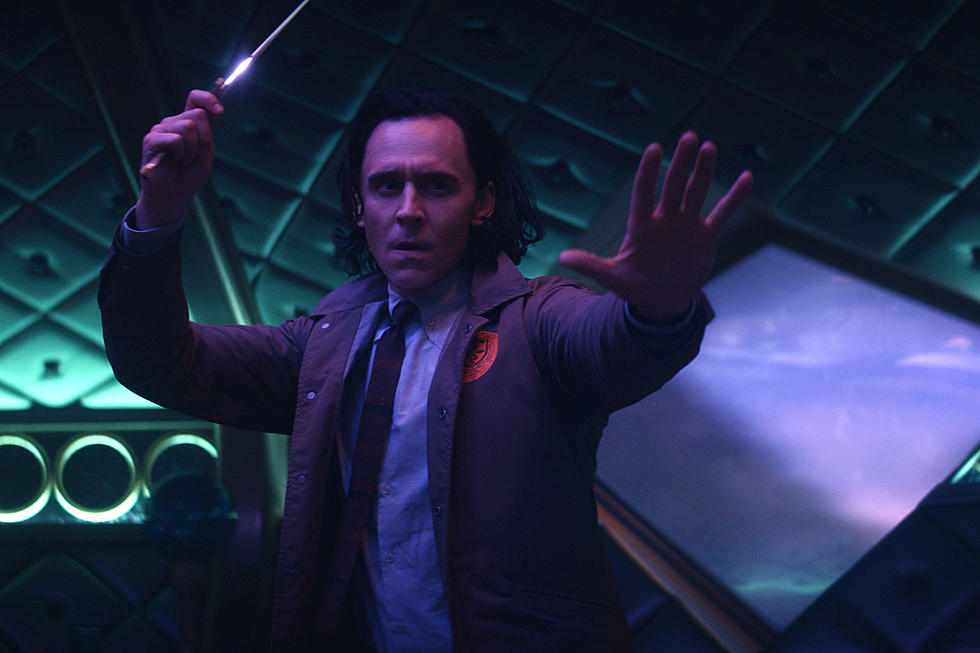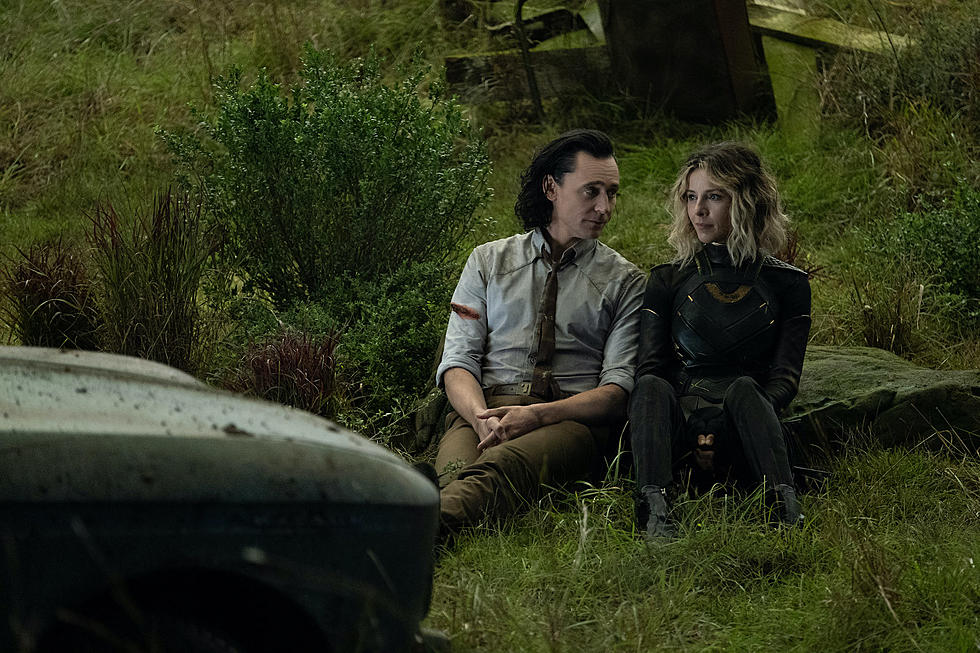![Sexy Loki, Queer Tricksters, And The Problem With LGBT Villains [Opinion]](http://townsquare.media/site/622/files/2013/11/Untitled-135.jpg?w=980&q=75)
Sexy Loki, Queer Tricksters, And The Problem With LGBT Villains [Opinion]
Good news; Marvel is launching a new ongoing series with an LGBT lead character. Loki: Agent of Asgard debuts in February from the creative team of writer Al Ewing and artist Lee Garbett, and Ewing confirmed via Tumblr that the lead character will not only be portrayed as bisexual --but be able to change gender. Bad news; Loki is not exactly a good guy. He's a trickster, a manipulator, a supervillain. He's also the second bisexual male to get his own ongoing book at Marvel, and here's the problem; the other one was Daken, son of Wolverine, and he was also a trickster, a manipulator and a supervillain. There's no doubt that the existence of a Loki series owes much to the character's newfound popularity as the villain of the Thor and Avengers movies. As played by actor Tom Hiddleston, the character became a sex symbol for the first time in his fifty-year Marvel history, and picked up a young, largely female, and very vocal fanbase. It makes perfect sense that Marvel should want to tap in to that market with a young, sexy, sexually adventurous leading man.
But queer villains are a well established and dangerous trope. Evil in fiction often takes the shape of gay, bisexual, transgender or otherwise gender-subversive characters, from Norman Bates in Psycho to Raoul Silva in Skyfall, by way of Ace Ventura, The Silence of the Lambs, Basic Instinct, The Talented Mr. Ripley, Watchmen, 300, Batman: The Killing Joke, every crime procedural on TV, and even the mirror universe versions of Star Trek and Buffy the Vampire Slayer.
In these works and in too many others to name, the audience is presented with the notion that amorality goes hand-in-hand with an "abnormal" view of sex and gender. A person who transgresses against law and good conduct, we are told, is the type to transgress against accepted gender roles and relationships. In this view of the world, crime and queerness are both indecent deviations; manifestations of a broken person.
Loki may actually be one of the most enduring examples of the trope -- not the Marvel Comics version created in the 1960s by Jack Kirby, Larry Leiber and Stan Lee, but the mythological forebear that writer Al Ewing intends to evoke in the new series. Loki was a thinker in a culture that valued fighters, a sometimes-female shapeshifter in a culture that valued certainty. He was the original effete European intellectual, mistrusted by the red meat-eating muscular menfolk. His trickster nature eventually and perhaps inevitably made him a father (and mother) of monsters and freaks, the enemy of the gods, and the cause of the world's destruction. The trickster became the villain. He was too much of a freak not to be a traitor.
That's the role that the queer villain plays; a threat to the "correct" order, intrinsically maladjusted to the way the world works. It's a fear that manifests in the real world in dangerous ways. Being gay, bi or trans has too often been presented as a threat; to children, to marriage, to public health, to everything sacred, up to and including God and democracy. There are even people who say that gay equality is a sign of the coming apocalypse or the rapture. It's Loki and Ragnarok all over again.
Otherness is also one reason why queer kids struggle so much with their identity. Not only does the perception that their existence is a challenge to the status quo make them a target, but being gay, bi or trans often means they feel cut off from the ways of life they've been raised to cherish as normal. Works of fiction that draw a parallel between queerness and wickedness can perpetuates that alienation.
Does this mean that all queer characters in fiction need to be absolutely and unambiguously morally pure? Not at all. First, no character outside of a parable should be that uncomplicated. Second, there is a legitimate artistic reason for portraying some queer characters as subversive. That's essentially what the trickster is; a marginal and mercurial character who exists outside of convention and challenges expectation. That's fundamentally queer.
I've used the word "queer" a lot here, and the word is now widely (but not universally) embraced as a collective identity for a broad family of non-straight and non-cisgender people, and its use points to a way in which these communities embrace otherness. The very qualities that can make an LGBT character seem dangerous and transgressive can also make them glamorous and seductive. Yes, queer identities have established cultural value as signifiers of deviancy, but they also have value as signifiers of radical reinvention, of rock and roll. That's really the same quality through a different lens. A character is both dangerous and glamorous if he undermines patriarchy and subverts convention, and audiences are drawn to that transgressiveness. Trickster stories are stories about growth through uncertainty, adaptation and reinvention. The history of tricksters in fiction is the prehistory of queer literature. Yet as morally subversive as tricksters can be, there's a big difference between a trickster and a villain, and there's room for queer villains in fiction as well.
I say that as someone with a vested interest in the subject. I write and produce my own podcast serial, Valentin & The Widow. Think Welcome to Night Vale, but without the Lovecraftian horror, and with a lot of 1920s derring-do. (It's nothing like Welcome to Night Vale, but that's the only podcast fiction most people have heard of.) Every one of the adventures I've written features queer and female villains because my heroes -- a troubled Russian sailor and a headstrong English aristocrat -- are queer and female (respectively). Having a gay hero and gay and bisexual villains both allows for sexual tension and hopefully breaks any association between sexuality and wickedness. I can show by example that I think villainous characters can be queer -- if there's heroic balance, or some other clear way of establishing that queerness itself is not being presented as a manifestation of evil. The last thing the LGBT community needs is another damaged caricature whose sexuality or gender identity directly manifests in a need to murder people.
I suspect that's not what we'll see in Loki: Agent of Asgard. Still, it gives me pause when I hear that Marvel is launching another ongoing series with a queer villain as the protagonist given how it turned out last time.
Dark Wolverine was Marvel's first ever explicitly queer male protagonist with his own ongoing solo series, and he was a villain. Series writers Daniel Way and Marjorie Liu seemed sensitive to the dangers inherent in such a project, because they simultaneously worked to make him a more ambiguous anti-hero even as they necessarily made his sexuality a part of his story. Unfortunately the book was cancelled and Daken reverted to extreme villainy, now queerer and more dangerous than before.
Loki could take the same course. Marvel has reversed the course of the Norse myths by turning the villain back into a trickster, largely through the work of writer Kieron Gillen in Journey Into Mystery with Doug Braithwaite and Young Avengers with Jamie McKelvie. Al Ewing faces a greater challenge. We already know his Loki will have a thick deceptive streak and broad sexual interests. We can speculate that he'll be a charmer and a seducer. There's a thin line from there to "predator," which Daken rather happily danced across.
Everything I've seen from Ewing suggests he's smart enough to knows what he's up against. I trust he'll write Loki as a complex anti-hero rather than as a pantomime bad guy, and I greatly look forward to the book.
Yet, the market being what it is, some other pale skinny English guy will replace Tom Hiddleston on Tumblr and the book will eventually run its course. What happens then? Will Loki follow Daken's example, sliding comfortably into a queer villain cliché, his moral dubiety and his sexuality now hand-in-glove?
My hope is that Ewing and Garbett do an excellent job and the book is a success that runs for many years, with its star cementing his place in the Marvel universe as a sexy, interesting, complex anti-hero.
My greater hope is that Marvel's next LGBT protagonist is a hero, and the next three or seven or twenty after that.
My greatest hope is that we finally turn our back on the idea that diversity is a sign of delinquency, that seduction is corruption, that femininity is weakness, that social progress is wickedness, and that transformation is a form of madness. I hope we see queer heroes and villains in the same proportion as the straight and cisgender heroes and villains.
The goal here is not to reach a place where the villain is never a flamboyant effeminate gay guy, but to get to a place where the hero sometimes is as well.
More From ComicsAlliance









